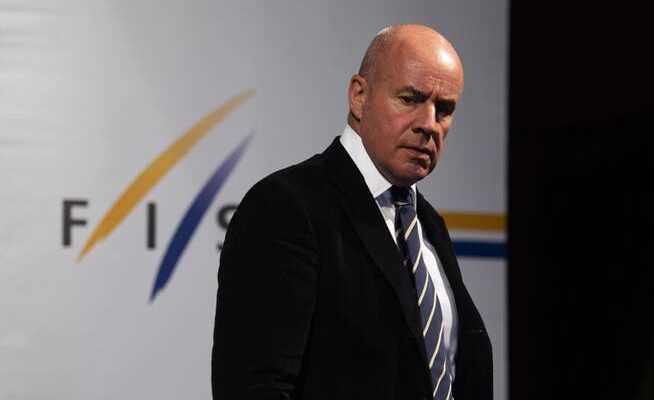At the World Ski Association Congress in Milan, the Swedish-British billionaire received a lesson – also from Swiss Ski. The composition of the Executive Board changed to his disadvantage.
Johan Eliasch has to reckon with even stronger headwinds.
Dexter Paine, one of four vice-presidents of the World Ski Federation FIS, chaired the meeting when the congress in Milan was about the re-election of President Johan Eliasch. In the absence of an opposing candidate, the close confidant suggested that Elijah be confirmed in office by acclamation, as is customary in such cases. But many state associations wanted nothing to do with it. 15 nations, mainly from the Alps and Scandinavia, two key regions of the small world of snow sports, had prepared an attempted coup.
The Austrian delegate Christian Scherer and his Croatian comrade-in-arms Vedran Pavlek acted as spokesmen. They repeated what the association of the dissatisfied had previously formulated in a letter: that the election of the president for the next four years must firstly be secret and secondly with the options “yes”, “no” and “abstention”.
In extreme cases, they hoped that they would be voted out and re-elected within three months. Influential member associations want to get rid of the Swedish-British billionaire just one year after he was elected to succeed Gian Franco Kasper, who has died in the meantime. But because the conflict with Eliasch had only escalated after the nomination period had expired, they had failed to put up an opposing candidate.
The resistance members boycotted the election
The Swiss FIS lawyer Stephan Netzle rejected the second part of the request with reference to the statutes. He noted that only ballot forms with the name of the only candidate are valid and no options “yes”, “no” and “abstain” are possible. The alliance then left the hall as announced. The Swiss delegate Bernhard Aregger, Managing Director of Swiss Ski, also did not take part in the presidential election.
Recording of the meeting, with the heated presidential election starting at 2:22 hours.
Eliasch received just 70 votes, only five more than a year ago in his landslide victory in the first ballot against the other three candidates Urs Lehmann, Sarah Lewis and Mats Årjes. The verdict means that at least 40 percent would have voted against Elijah or abstained had that been possible.
For Eliasch, the lousy result is a lesson to remember. When the NZZ asked him at the subsequent Zoom press conference how satisfied or disappointed he was, Eliasch said: “I got 100 percent of the valid votes. All I can say is that my majority is between 60 and 100 percent.”
The coup attempt failed, but perhaps only temporarily. According to Diego Züger, deputy managing director of Swiss Ski, legal tests are already underway to determine whether Eliasch’s re-election is contestable. The alliance interprets the statutes differently than the FIS lawyer Netzle. “An election in which the delegates only had one option to cast a valid vote does not coincide with the legal and democratic understanding of us and many other member associations,” said Züger.
Above all, the resisters object to Eliasch’s plan, according to which not only the marketing of the World Cup events should be centralized, but also the member associations should no longer be the rights holders. Eliasch initially failed with the raid-like expropriation attempt, but after the congress the haggling in the FIS board will continue.
An Olympic and world champion replaces Schröcksnadel
What is bad for Eliasch is that the headwind in the body after the renewal elections on Thursday is likely to become even more violent. Vice President Dexter Paine had been one of the most important remaining allies, but now, surprisingly, the American was no longer elected to the board. It was also a vote against Eliasch, who had previously antagonized his most powerful election worker, Peter Schröcksnadel. The 80-year-old Austrian no longer competed, and Patrick Ortlieb, the 1992 Olympic champion and 1996 world champion in downhill, took his place on the FIS board.
Swiss Ski President Urs Lehmann, a kind of unofficial opposition leader on the FIS Board, was re-elected with the third-best result of all 23 candidates. The Russian Jelena Välbe, who was also part of the body at the congress as if there were no war in Ukraine, was voted out with the worst result. At least this problem has been sorted out reasonably elegantly in Milan.
